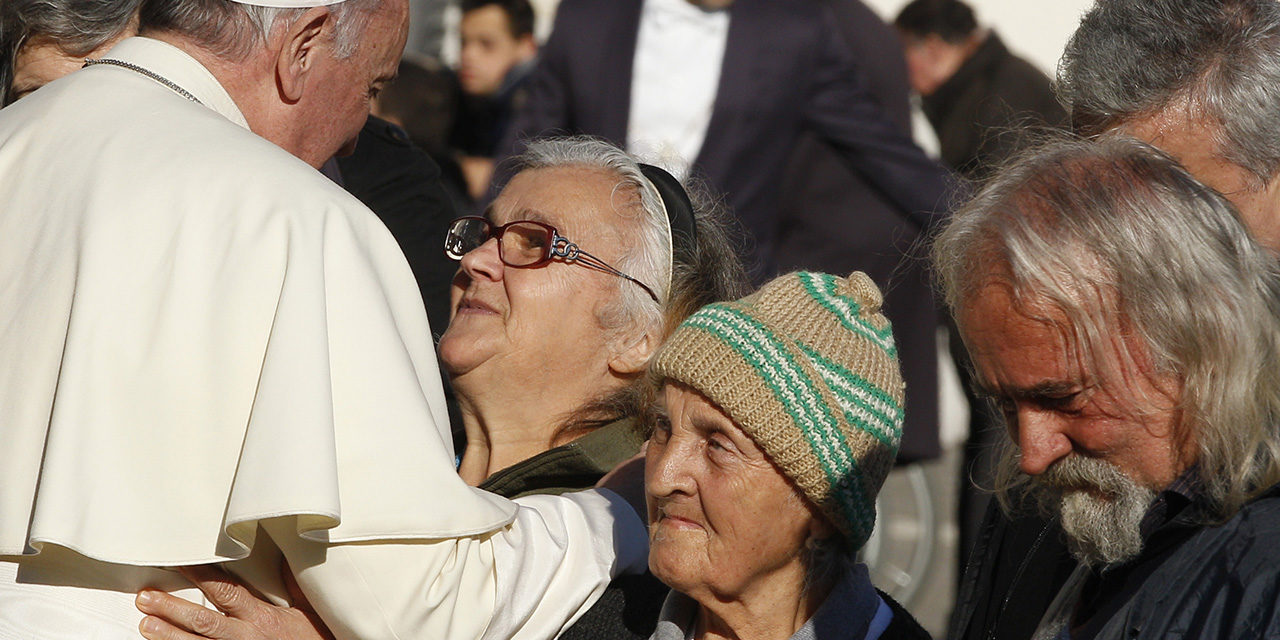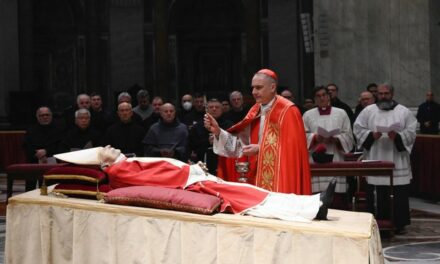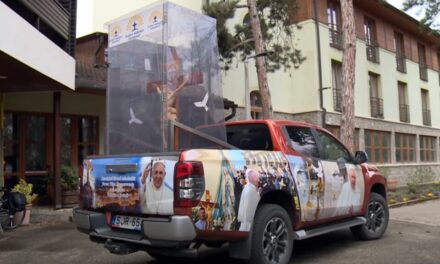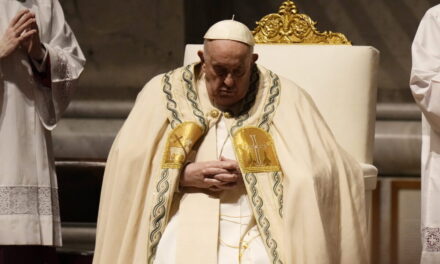This year, in the Church, we celebrate the World Day of the Poor on November 14, the 33rd Sunday in the middle of the year. You can read Pope Francis' message for World Day, which was published under the title "The poor will always be with you" (Mk 14:7).
1. "The poor will always be with you" (Mk 14:7). Jesus spoke these words at a feast in Bethany, at the house of a certain Simon known as "the leper", a few days before Easter. According to the evangelist's story, a woman entered with an alabaster basin full of precious ointment and poured its contents on Jesus' head. His action caused great astonishment and gave rise to two interpretations.
The first was the indignation of some of those present, including the disciples, who, considering the value of the anointing—about 300 denarii, the equivalent of a laborer's annual wages—believed that it should have been sold and its price given to the poor. According to the Gospel of St. John, it was Judas who came up with this point of view: "Why didn't they sell the oil for 300 denarii instead and distribute it among the poor?" But the evangelist notes: "He did not speak like that because he was concerned about the poor, but because he was a thief: he handled the money and appropriated what was entrusted to him" (Jn 12:5-6). It is no coincidence that this harsh criticism leaves the traitor's mouth: it proves that those who do not respect the poor betray the teaching of Jesus and cannot be disciples of the Lord. In this regard, let us remember the strong words of Origen: "Judas seemed to be concerned about the poor [...]. If someone today manages the Church's money and, like Judas, speaks in defense of the poor, but then takes out what they put in, let him share the fate of Judas" (Commentary on the Gospel of Matthew, 11, 9).
The second interpretation is provided by Jesus, and this explains the deep meaning of the woman's action. He says, “Leave it! What are you fussing about, because he did me good!" (Mark 14:6). Jesus knows that his death is approaching, and in the woman's action he foresees the anointing of his lifeless body before burial. It was beyond anything that those present could have imagined. Jesus reminds them that he is the first among the poor, the poorest of the poor, because he represents them all. The Son of God accepts this woman's gesture because of the poor, the lonely, the excluded and the victims of discrimination. With her feminine sensitivity, she alone understood the Lord's state of mind. This anonymous woman, who perhaps for this very reason was meant to represent all those women who were silenced over the centuries and who suffered violence, became the first of those women who played an important role in the most important moments of Christ's life: his crucifixion, his death, his burial and his Resurrection. upon appearance. Women, who have so often been relegated to the background and excluded from leadership positions, become the protagonists of the story of revelation in the pages of the Gospel. The closing sentence of Jesus, which connects this woman with the great mission of evangelization, is telling: "Truly I say to you, wherever the gospel is preached in the world, her deed will also be remembered" (Mk 14:9).
2. This strong "empathy" developed between Jesus and the woman and the way in which Jesus interprets the woman's action, in contrast to the scandalous approach of Judas and others, can lead to a fruitful reflection on the inseparable relationship between Jesus, the poor and the preaching of the Gospel.
The face of God revealed by Jesus is the face of the Father who is concerned about the poor and is close to them. The entire activity of Jesus testifies to the fact that poverty is not a consequence of fate, but a concrete sign of his presence among us. We do not find him when and where we want, but in the lives of the poor, in their suffering and deprivation, in the often inhumane conditions in which they are forced to live. As I never tire of repeating, the poor are the true proclaimers of the Gospel, since they were the first to be evangelized and who were invited to share in the Lord's happiness and his kingdom (cf. Mt 5:3).
The poor - in whatever situation and circumstances they live - evangelize us because they allow us to discover the Father's truest features in a new way. "The poor can teach us many things. Beyond being part of the sensus fidei, they know the suffering Christ through their sufferings. We must all allow ourselves to be evangelized. The new evangelization is a call to recognize the salvific power of their lives and place it at the center of the Church's journey. Our vocation is to discover Christ in them, to put our voices at their service in connection with their affairs, but also to be their friends, to listen to them, to understand them, and to receive the mysterious wisdom that God wants to communicate to us through them. Our commitment does not consist solely of supporting and helping activities or programs; what the Holy Spirit mobilizes is not an unbridled activism, but above all a turning to see him as a reality with ourselves. This loving attention to the poor is the beginning of true interest, and it is from this that one must effectively seek the good of the poor" (Apostolic Exhortation Evangelii Gaudium, 198-199).
3. Jesus is not only on the side of the poor, but also shares their fate. This is a hard lesson for your students at any age. His words that "the poor will always be with you" also refer to this: the poor will always be with us, but this should not make us indifferent, on the contrary, it should move us to share life mutually: we cannot entrust this task to others. The poor are not people "outside" our community, but our brothers and sisters, whose sufferings we must share in order to alleviate their need and exclusion, to restore their lost dignity and ensure the social integration they need. Also, as we know, charity presupposes a giver and a receiver, while mutual sharing breeds brotherhood. Almsgiving is occasional, but mutual sharing is permanent. The former risks being gratifying to those who do it and humiliating to those who receive it; the latter strengthens solidarity and creates the necessary conditions for the realization of justice. In short, when believers want to see Jesus in person and touch him with their hands, they know where to turn. The poor are the sacraments of Christ; they represent his person and refer to him.
We have many examples of saints who made sharing with the poor a part of their lives. Among others, I am thinking of Father Damján de Veuster, the holy apostle of lepers, who generously responded to the call to go to the island of Molokai, which had become a ghetto for lepers, to live and die with them. He went to work and did everything he could to give the poor, the sick and the outcasts a decent life. She became both a doctor and a nurse, not caring about the risks involved, and brought the light of love to the "colony of death," as the island was called at the time. He himself caught leprosy, which is a sign that he fully shared the fate of his brothers, for whom he gave his life. His testimony is very timely these days, during the coronavirus epidemic. God's grace is undoubtedly at work in the hearts of all the many people who, without any fuss, sacrifice themselves for the poorest and share with them in a concrete way.
4. We must therefore wholeheartedly follow the call of the Lord: "Repent and believe in the Gospel" (Mk 1:15). This conversion consists primarily in opening our hearts to recognize the many forms of poverty and manifesting the kingdom of God through our lifestyle in accordance with our professed faith. Often the poor are seen as separate people, as a "category" in need of special charitable service. However, following Jesus requires changing this way of thinking, that is, accepting the challenge of sharing and participation. Being a disciple of Jesus means the decision not to accumulate earthly treasures, which create the illusion of security that is actually fragile and fleeting. On the contrary, it means a willingness to get rid of everything that holds us back from achieving true happiness and satisfaction, to recognize what is permanent, which no one and nothing can destroy (cf. Mt 6:19-20).
Here too, Jesus' teaching goes against the grain, because he promises something that can only be seen and experienced with complete certainty through the eyes of faith. "Whoever leaves his home, brothers, sisters, father, mother, wife, children or land for my name will receive a hundred, and eternal life will be his inheritance" (Mt 19:29). If we do not choose to be poor in passing riches, worldly power and vanity, we will never be able to give our lives in love; we will live a fragmented existence, although full of good intentions, we will not be able to transform the world. Therefore, we must decide to open ourselves to Christ's grace, which can make us witnesses of his boundless love and restore the authenticity of our presence in the world.
5. The Gospel of Christ encourages us to show special concern for the poor and to recognize the many forms of appearance of moral and social disorder, which create new and new forms of poverty. It seems that the perception that the poor are not only responsible for their situation, but also an intolerable burden for an economic system that puts the interests of a few privileged groups at the center, is becoming more and more widespread. A market that ignores or chooses moral principles creates inhumane conditions for people in an already precarious position. Thus, we see the emergence of new traps of deprivation and exclusion, set up by unscrupulous economic and financial actors who lack humanitarian sense and social responsibility.
Last year, another calamity appeared, which further increased the number of the poor: the pandemic. It continues to knock on the doors of millions of people, and even if it does not bring suffering and death, it is still a harbinger of poverty. The number of poor has increased disproportionately, and tragically, this will continue in the coming months. In some countries, the pandemic has extremely serious consequences, so that even the most necessary conditions for life are not available for the most vulnerable. The long queues in front of free kitchens are clear signs of this deterioration. It is necessary to find the most suitable means of fighting the virus at the world level, without taking into account selfish individual interests. It is especially urgent to give concrete answers to those who suffer from unemployment, among whom are many family fathers, women and young people. The solidarity and the generosity, which, thank God, many are witnessing, are a very important tool in the current situation, together with long-term projects for the advancement of humanity.
6. Nevertheless, the far from self-evident question remains: how can we give a tangible answer to the millions of poor people who are often only met with indifference and even dislike? What path of justice must be followed so that social inequalities can be overcome and human dignity, which is so often trampled underfoot, can be restored? Individualistic lifestyles are complicit in the development of poverty and often blame the poor for their plight. However, poverty is not fate, if not the consequence of selfishness. Therefore, it is crucial to initiate development processes in which everyone can develop their abilities, so that the diversity of complementary abilities and roles leads to a common resource of mutual participation. There are many forms of poverty among the "rich" that could be alleviated by the wealth of the "poor" if they met and got to know each other! No one is so poor that they cannot give something of themselves in mutual exchange. The poor should not only receive; but they must be put in a position to give, because they know well how to give back generously. How many good examples of sharing are in front of us! The poor often give us an example of solidarity and sharing. It is true that they are people who lack some things, often many things, including the most necessary, but they do not lack everything, because they preserve the dignity of God's children, which nothing and no one can take away from them.
7. Therefore, a different approach to poverty is needed. This challenge must be taken up by governments and global institutions with a forward-looking social model capable of combating the new forms of poverty that are now sweeping the world and that will have a decisive impact on the coming decades. If the poor are marginalized, as if they themselves are responsible for their condition, then the very concept of democracy is in crisis and all social policies fail. We must humbly admit that we are often incompetent when it comes to the poor. We talk about them abstractly, we stop at statistics, and we believe that we can move people's hearts with one documentary at a time. Poverty, on the contrary, should inspire us to design creatively to increase the freedom necessary for all people to live fulfilled lives according to their potential. We must reject the illusion that freedom comes and grows through the possession of money. The effective service of the poor prompts us to act and allows us to find the most suitable ways to uplift and support this part of humanity, which is too often anonymous and silent, but on which the face of the Savior who asks for our help is pressed.
8. "The poor will always be with you" (Mk 14:7). This is a call to never miss an opportunity to do good. Behind this we can recognize the ancient biblical command: "If there is a poor among you, a brother of yours in one of your cities or in your land, which the Lord your God will give you, do not harden your heart and do not close your hand to your brother, the poor, but rather open and your hand, and gladly give as much as you need in your distressed situation. […] Give to him with a good heart, and when you give, do not let your heart be filled with malice. For your good deeds, the Lord your God blesses you in all your steps and in all the work of your hands. There will always be poor people on earth. That is why I now command: open your hand to your brother, to the needy and poor living on your land" (MTurv 15.7-8.10-11). In a similar way, the apostle Paul urged the Christians of his communities to rush to the aid of the poor of the first Jerusalem community, and to do this "not unwillingly or out of compulsion, for God loves a cheerful giver" (2 Corinthians 9:7). Our job is not to appease our conscience by begging, but to fight the culture of indifference and injustice towards the poor.
In this context, it is appropriate to recall the words of St. John Chrysostom: "He who is generous should not hold the poor accountable, but should simply relieve their poverty and satisfy their needs. The only defense of the poor is their poverty and the emergency in which they live. Do not ask them for anything else; but even if they are the most wicked people in the world, if they lack the necessary food, let us deliver them from starvation. […] A merciful man is like a port for those in need: the port receives and frees from danger all those who have suffered shipwreck; be they evil-doers, good men, or whatever, as long as they are in danger, he welcomes them into his saving bosom. Therefore, if you see a man or woman on land who has suffered shipwreck because of poverty, do not judge them, do not ask them about their behavior, but deliver them from their misfortune" (Discourses on poor Lazarus, II, 5).
9. It is of fundamental importance that we understand with greater sensitivity the needs of the poor, which are constantly changing, as are their living conditions. Today, in more economically developed areas of the world, people are less willing to face poverty than before. The state of relative prosperity to which we are accustomed makes it difficult to make sacrifices and accept deprivation. People are ready for anything, just don't deprive them of the fruits of easy profit. Thus we fall into various forms of resentment, convulsive nervousness and stalking, which create fear, anxiety and, in some cases, violence. This is not how we can build our future; these behaviors are themselves forms of poverty that cannot be ignored. We must be open to understanding the signs of the times that call us to find new ways to evangelize the world today. Immediate assistance to alleviate the needs of the poor must not prevent us from proactively applying new forms of Christian love and mercy in response to the new forms of poverty experienced by humanity.
I wish that the fifth observance of the World Day of the Poor will take root even more in our local churches and encourage an evangelizing movement that meets the poor personally, wherever they are. We cannot wait for the poor to knock on our door; our urgent task is to reach them in their homes, in hospitals and nursing homes, on the streets and in the dark corners where they sometimes hide, in shelters and reception centers... It is important to understand how they feel, what they experience and what their hearts desire. Let us embrace Father Primo Mazzolari's heartfelt request: "Please do not ask if there are poor people, who they are and how many there are, because I am afraid that such questions will distract attention or be an excuse not to listen to our conscience and the clear call to our hearts. [...] I have never counted the poor, because you cannot count them: the poor should be hugged, not counted" ("Adesso" No. 7, April 15, 1949). The poor are among us. How evangelical it would be if we could say with complete truth: we are also poor, because only in this way will we be able to truly recognize them, make them a part of our lives and a means of our salvation.
Dated in Rome, at St. John Lateran, on June 13, 2021, the memorial day of St. Anthony of Padua.
FRANCIS












